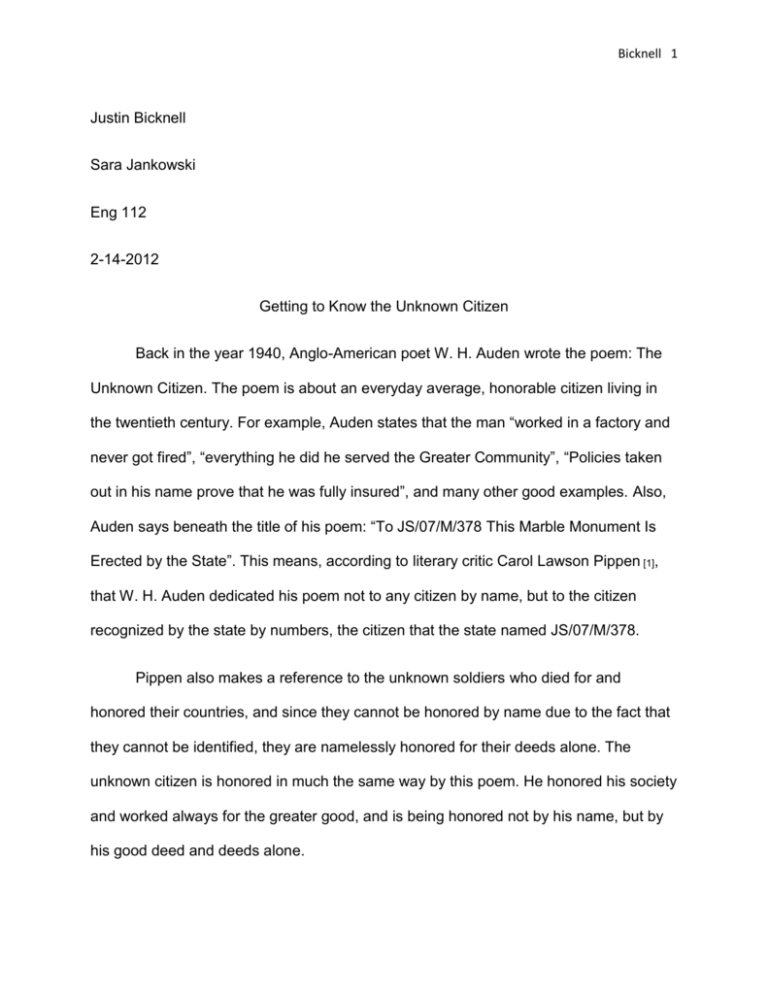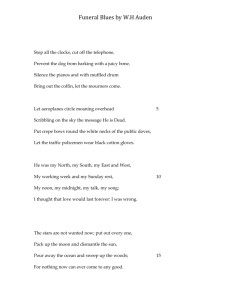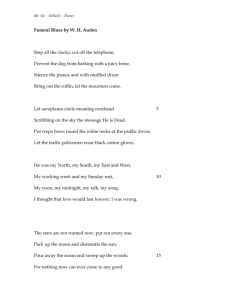Inquiry 2 - WordPress.com
advertisement

Bicknell 1 Justin Bicknell Sara Jankowski Eng 112 2-14-2012 Getting to Know the Unknown Citizen Back in the year 1940, Anglo-American poet W. H. Auden wrote the poem: The Unknown Citizen. The poem is about an everyday average, honorable citizen living in the twentieth century. For example, Auden states that the man “worked in a factory and never got fired”, “everything he did he served the Greater Community”, “Policies taken out in his name prove that he was fully insured”, and many other good examples. Also, Auden says beneath the title of his poem: “To JS/07/M/378 This Marble Monument Is Erected by the State”. This means, according to literary critic Carol Lawson Pippen [1], that W. H. Auden dedicated his poem not to any citizen by name, but to the citizen recognized by the state by numbers, the citizen that the state named JS/07/M/378. Pippen also makes a reference to the unknown soldiers who died for and honored their countries, and since they cannot be honored by name due to the fact that they cannot be identified, they are namelessly honored for their deeds alone. The unknown citizen is honored in much the same way by this poem. He honored his society and worked always for the greater good, and is being honored not by his name, but by his good deed and deeds alone. Bicknell 2 Embedded all over the text of this poem, are many hints as to what time period it was written and is taking place in, other that the publication date by the title of course. The most prominent to me being the lines: “And had everything necessary to the Modern Man, A phonograph, radio, a car and a Frigidaire.” The first of these two lines clarifies that the time period this poem is taking place is modern as well as the citizen’s ‘necessary’ possessions that he has. The first of which that is mentioned being a phonograph, which certainly aren’t exactly from the twentyfirst century that we live in. A phonograph, for those who do not know, is a device, introduced in 1877 by Thomas Edison, used to play sound recording. The second that may not sound so familiar is Frigidaire, which is a company that produces refrigerators; they have been around since 1916 and are still in business. The other two possessions mentioned, the car and radio, although are still fairly modern in current day, just go to show how average the man was. One of the biggest and more prominent meanings of this poem, to me, is Auden’s take on a free society verses a controlling society. How when citizens of a country or members of any other group of people try their best not to upset the balance of power by fitting into a mold that their culture has set, but in turn lose their sense of individuality. The example W. H. Auden chose to represent this theme in his poem is, obviously, the unknown citizen described in the poem. The man is described as an ideal member of society; this is stated right out front in the first five lines: Bicknell 3 “He was found by the Bureau of Statistics to be One against whom there was no official complaint, And all the reports on his conduct agree That, in the modern sense of an old-fashioned word, he was a saint, For in everything he did he served the Greater Community. The contents of these first five lines basically describe an all around nice guy to me. No one really had any problems with him, everything he did he did for the greater good of the community, and “in the modern sense of an old-fashioned word”, the man was a saint. These qualities, according to our culture then and still now, are considered good qualities for a person to have, and I agree with that, and these are not the only good characteristics the poem gives to this unknown citizen. There are many, many more, such as: “He worked in a factory and never got fired, But satisfied his employers, Fudge Motor Inc. Yet he wasn’t a scab or odd in his views, For his Union reports that he paid his dues, (Our report on his Union shows it was sound) And our Social Psychology worker found Bicknell 4 That he was popular with his mates and liked a drink.” I think it can safely be said that this man was an ideal example to all of those who knew and saw him, but despite all of the wonderful characteristics this poem said he had, he still doesn’t really stand out. He certainly wasn’t the only good citizen out there, and as far as the state’s numbers and statistics go, he is virtually indistinguishable from every other good member of society on record. Where is his individuality, which in my opinion is one of the greatest possessions a person can have, and not one time does this poem mention a quality of this man that makes him stand out from the rest of the crowd. Now, do not misinterpret the message in this poem, W. H. Auden is not saying that obeying the law and following codes of conduct is a bad thing and that you should rebel and act out against all cultural conformity. That is not at all what he is saying, the rules and laws we have today are there to keep the people safe and uphold the peace. What he really is saying is that although you should still follow the law, you must still express your individual thoughts, within the limits of the law. You cannot fall into a rut being exactly the same as everyone else; this forms a giant blob of identical human with little or no diversity throughout our society. This is not a good thing, when everyone thinks the same and never comes up with any ideas of their own, the culture gets caught in a progressive rut, never improving their society, be it socially, economically scientifically, est. The lesson that I took away from this is that everyone should just be themselves and not worry so much about fitting in. Because ultimately in the end, trying too hard to Bicknell 5 fit it just slows everything down, and keeps you from living your life to the fullest that you possibly can. Bicknell 6 Annotated Bibliography Abcarian, Richard, and Marvin Klotz. Literature: the human experience. New York: St. Martin's Press, 1973. Print. 2-5-2012 This book allowed me to read the poem, The Unknown Citizen, which is what my paper is all about. It allowed me to study the poem more closely, line by line and word by word. Jason, Philip K., and Tracy Georges. Master plots II. Rev. ed. Pasadena, Calif.: Salem Press, 2002. Print. 2-17-2012 This book contains the poem, The Unknown Citizen, and comprehensive coverage of it, offering a better understanding of the poem's meaning. Pippen, Carol Lawson. The Unknown Citizen. Salem Press, 2002. Print. 2-16-2012 Pippen’s work analysis on the poem: The Unknown Citizen, give much background information on the poem itself. Also, it reviews many of the forms and devices, and themes and meanings of the poem. I find this source very useful myself; it gives me insight into many of the themes of the poem and provides many background facts on it as well. I can really put this information to good use when writing my actual paper. Meyer, Bruce. An Essay on “The Unknown Citizen”. Poetry for Students; Detroit: Gale from Literature Resource Center. Print. 2-16-2012 Bicknell 7 This essay gives much insight into the meanings of the poem, The Unknown Citizen, as well as to the reasons for Auden writing it in the first place. This information could be helpful for me to use when I assess the themes and meanings of the poem myself. "The Unknown Citizen Analysis W.H. Auden : Summary Explanation Meaning Overview Essay Writing Critique Peer Review Literary Criticism Synopsis Online Education." Writing Workshop, or something. Elite Skills Classics, 6 Oct. 2011. Web. 22 Feb. 2012. The top comment posted on this website helped me to further grasp the meanings behind The Unknown Citizen and W. H. Auden’s purpose for writing it.






